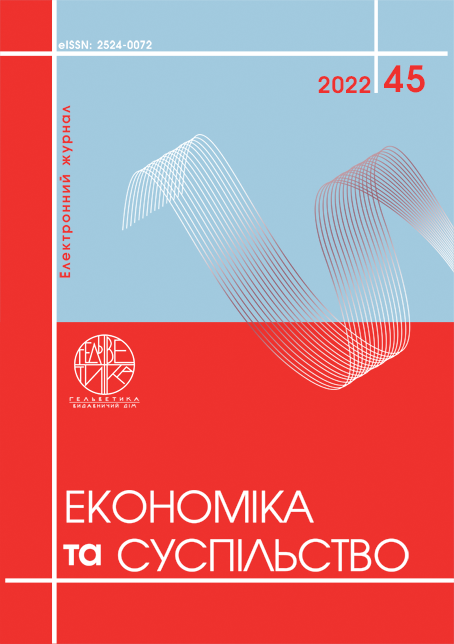DETERMINATION OF MODERN FACTORS OF ECONOMIC DEVELOPMENT OF THE COUNTRIES OF THE EUROPEAN UNION AND THE WORLD
Abstract
The work examines the issue of economic development of the countries of the world and Ukraine under the influence of factors of modern world development. These factors include the hostilities in Ukraine and the effects of the knockdown of COVID-19. Prior to the onset of this crisis, the global economy was on the mend but had not yet fully recovered from the COVID-19 pandemic, with significant divergence between the recovery trajectories of advanced economies on the one hand and emerging and developing economies on the other . Military actions have become another dangerous factor that has befallen the world economy during the pandemic, and is causing a lack of resources in a number of areas besides energy and agriculture. Because of tightly integrated global supply chains, production disruptions in one country can cascade across the globe very quickly. Ukrainian companies supply specialized production resources, and the lack of some of them is already affecting European car manufacturers. Some countries of Eastern Europe and Central Asia are closely connected with Russia by trade relations and flows of remittances. Today, the economic development of the whole world is affected by the following factors: the military-political crisis in Ukraine, the deterioration of the economic situation in other countries as a result of hostilities, and the consequences of the fight against the COVID-19 epidemic. The paper examines the influence of these factors on the general economic condition of EU countries and other countries of the world. Military actions caused a humanitarian crisis in our country. This led to the deterioration of the economic and social situation on the territory of Ukraine. There was an acceleration of migration processes, a stoppage of production chains. The negative impact can also be felt in other countries. These negative factors are related to economic and financial consequences and secondary effects arising on the markets of raw materials and fuel. While the global economy has not yet fully recovered from the crisis caused by COVID-19. In this case, there are prerequisites for significant economic difficulties on a global scale, which must be predicted.
References
Auclert Adrien, Hannes Malmberg and Matthew Rognlie. 2021. “Demographics, Wealth, and Global Imbalances in the Twenty-First Century.” NBER Working Paper 29161, National Bureau of Economic Research, Cambridge, MA.
Black Simon, Ian Parry, James Roaf, and Karlygash Zhunussova. 2021. “Not Yet on Track to Net Zero: The Urgent Need for Greater Ambition and Policy Action to Achieve Paris Temperature Goals.” IMF Staff Climate Note 2021/005, International Monetary Fund, Washington, DC.
Borio Claudio, Piti Disyatat, Mikael Juselius, and Phurichai Rungcharoenkitkul. 2017. “Why So Low for So Long? A Long-Term View of Real Interest Rates.” BIS Working Papers, Bank for International Settlements, Basel.
Caballero Ricardo J., and Emmanuel Farhi. 2015. “The Safety Trap.” NBER Working Paper 19927 National Bureau of Economic Research, Cambridge, MA.
Casella Bruno, Richard Bolwijn, Daniel Moran, and Keiichiro Kanemoto. 2019. “Improving the Analysis of Global Value Chains: The UNCTAD-Eora Database.” Transnational Corporations 26(3). United Nations, New York and Geneva.
Hoel Michael. 1994. “Efficient Climate Policy in the Presence of Free Riders.” Journal of Environmental Economics and Management 27 (3): 259–74.
Novta Natalija and Evgenia Pugacheva, “The Macroeconomic Costs of Conflict”, Journal of Macroeconomics 68, 2021.
Гірман А.П., Гвоздов Б.Ю., Брусенцева А.С. Формування стратегії розвитку України в умовах глобалізації. Регіональні студії. 2021. № 24. С. 116–122.
Горнакова Д.В., Фокіна С.Ю., Юстіновіч Ю.Г. Сучасні передумови розвитку світової економіки. Актуальні проблеми гуманітарних та природничих наук. 2016. № 1–3. С. 1–5.
Кулицький С. Зовнішня торгівля України: стан, проблеми та перспективи. Україна: події, факти, коментарі. 2018. № 10. С. 39–52.
Труфанова Д.О. Сучасний стан світової економіки і подальші перспективи її розвитку. Концепт. 2016. Т. 11. С. 2656–2660.
Auclert Adrien, Hannes Malmberg and Matthew Rognlie (2021) “Demographics, Wealth, and Global Imbalances in the Twenty-First Century.” NBER Working Paper 29161, National Bureau of Economic Research, Cambridge, MA.
Black Simon, Ian Parry, James Roaf, and Karlygash Zhunussova (2021) “Not Yet on Track to Net Zero: The Urgent Need for Greater Ambition and Policy Action to Achieve Paris Temperature Goals.” IMF Staff Climate Note 2021/005, International Monetary Fund, Washington, DC.
Borio Claudio, Piti Disyatat, Mikael Juselius, Phurichai Rungcharoenkitkul. (2017) “Why So Low for So Long? A Long-Term View of Real Interest Rates.” BIS Working Papers, Bank for International Settlements, Basel.
Caballero Ricardo J., Emmanuel Farhi (2015) “The Safety Trap.” NBER Working Paper 19927 National Bureau of Economic Research, Cambridge, MA.
Casella Bruno, Richard Bolwijn, Daniel Moran, and Keiichiro Kanemoto. (2019). “Improving the Analysis of Global Value Chains: The UNCTAD-Eora Database.” Transnational Corporations 26(3). United Nations, New York and Geneva.
Hoel Michael. (1994). “Efficient Climate Policy in the Presence of Free Riders.” Journal of Environmental Economics and Management, 27 (3): 259–74.
Novta Natalija and Evgenia Pugacheva (2021) “The Macroeconomic Costs of Conflict”, Journal of Macroeconomics, 68.
Hirman A., Hvozdov B., Brusentseva A. (2021) Formuvannia stratehii rozvytku Ukrainy v umovakh hlobalizatsii[Formation of Ukraine's development strategy in conditions of globalization]. Rehionalni studii – Regional studios. № 24, pp. 116—122.
Hornakova D., Fokina S., Yustinovich Yu. (2016) Suchasni peredumovy rozvytku svitovoi ekonomiky [Modern prerequisites for the development of the world economy]. Aktualni problemy humanitarnykh ta pryrodnychykh nauk – Actual problems of humanities and natural sciences. № 1–3, pp. 1–5.
Kulytskyi S. (2018) Zovnishnia torhivlia Ukrainy: stan, problemy ta perspektyvy [Foreign trade of Ukraine: state, problems and prospects]. Ukraina: podii, fakty, komentari. – Ukraine: events, facts, comments, № 10, pp. 39–52.
Trufanova D.O. (2016) Suchasnyi stan svitovoi ekonomiky i podalshi perspektyvy yii rozvytku [The current state of the world economy and further prospects for its development]. Kontsept – Concep . T. 11, pp. 2656–2660.


